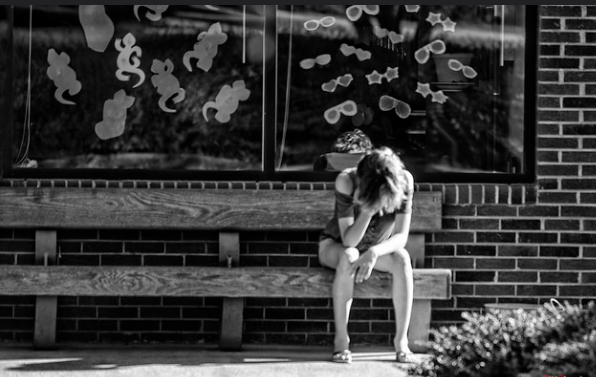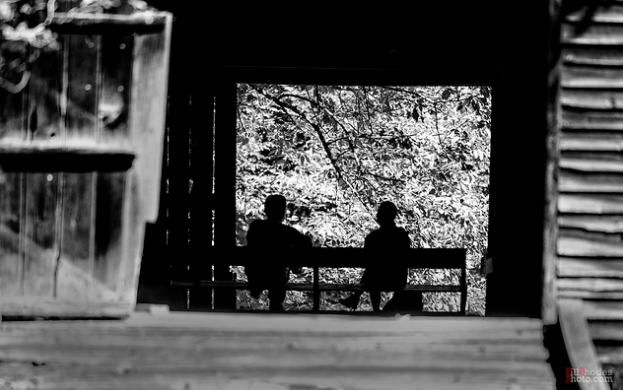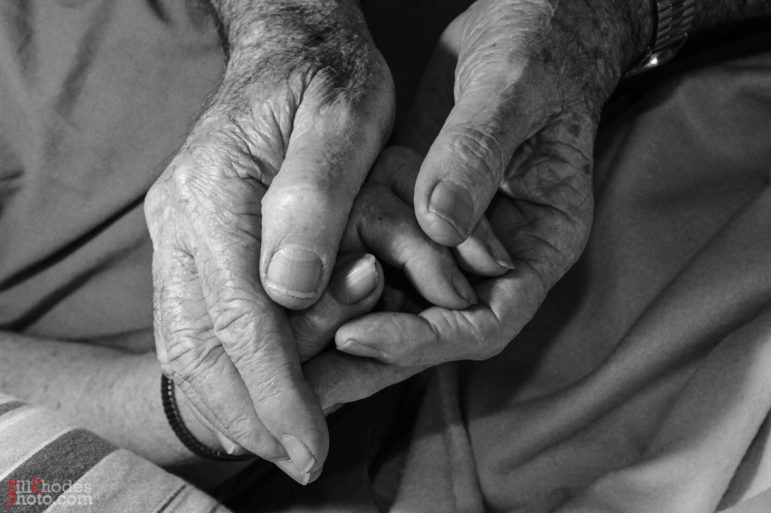
Editor’s note: This column deals with mental health and substance abuse.
Here in the northern hemisphere, the Wheel of the Year has spun us into the dark time of the year. I am ready to immerse myself in the deep work of these darkling days and am profoundly mindful of the fact that I am once again moving into the darkness with a sense of peace rather than uncertainty. I have no doubt that my spiritual journey, work with land spirits, and elemental work have carried me to this sometimes place of balance after years of turmoil.
For what seemed at the time like many years – but now, I realize, never nearly enough – I moved into autumn and winter with a sense of foreboding. I have written before about my youngest daughter’s struggle with mental illness, including substance abuse, and how for reasons I will never fully understand her illnesses always began to spiral out of control in November. Like Persephone, she would descend into an underworld, and every year she would return to us in the spring, until the year that she did not.

A young person sits on a bench, head in hand [B. Rhodes]
The urgency of her situation was a focal point that sometimes obscured my awareness of the mental health cycles of other people. But the more work I did in trying to understand her needs and how best to help her, the more I became aware of what now seems to be common knowledge: that during the fall and winter months, decreased exposure to sunlight, being cooped up indoors, the stress of inclement weather and school or work schedules, holidays, and many other factors contribute to an increase in the symptoms of mental health disorders. Add to that the extreme economic, social, housing, health, and family issues many people are currently facing, and darkness could fall to a whole new level.
Throughout the pandemic and resultant lockdowns and social isolation, spiritual and secular communities have made a great deal of effort regarding outreach and education on mental health matters, including but not limited to depression, anxiety, suicide prevention, and substance abuse. (For this writing, substance abuse is included under the umbrella term, “mental health.”) But I have seen very little in what I have read over the past 18 months that would help the average citizen understand why their person might need assistance in finding help, or how difficult it can be to walk the line between being an advocate and being an enabler.
Society will not resolve all the problems that go hand-in-hand with mental health crises by making advances in access to healthcare. People will still live through the day-to-day agony of watching loved ones suffer. In a world that sometimes seems to be moving towards a greater understanding of healing, Pagan communities and society as a whole can relieve some of that agony by continuing to work to set aside the institutionalized and prejudicial belief that people who struggle with mental health issues could get better if they want to; that they need only to make better choices, or that they only continue to suffer due to laziness or attention-seeking. Additionally, movement in the direction of releasing biased mindsets will further destigmatize all aspects of mental illness and disorder, having the circular effect of minimizing negative beliefs and perceptions. The wheel turns round and round.
People view mental health issues through rose-colored glasses, clear-as-day glasses, and glasses that are the beautiful green color of jade. Unfortunately, it takes time and experience to grow into the lenses that kaleidoscope the three together, and people who need those kaleidoscopic lenses to view their struggling loved ones often do not have the luxury of time. I share my own experiences, colored by a mixture of the kaleidoscope and love and grief, in the hope that my words might help even one other person find their way through the darkness.
It can be a mind-bending task for mentally healthy, rational adults to wrap their heads around the fact that people who are struggling with mental health issues are often functionally impaired to the point that it is difficult, if not impossible, for them to make rational, logical decisions, or engage in rational, logical behaviors. If a reasonably healthy person cannot understand that, an unhealthy person isn’t likely to understand it either. Logic would say that recovering from an illness is as simple as moving from Point A to Point B to Point C. But even in the best of times, the process is seldom that easy.
During a pandemic and time of national economic crisis, it becomes daunting, to say the least. While crisis telephone lines are usually available and can be helpful in an immediate moment of need, in reality, they are a stop-gap method of intervention that frequently does little towards reducing the challenge of establishing treatment for people whose ability to function is impaired by mental and/or physical duress.
When dealing with a loved one’s mental health issues, it can be helpful, even sanity-saving, to learn how to establish healthy boundaries and how to know when it is okay to cross those boundaries. Doing so provides clarity and consistency and helps protect all parties involved. Another side to this sometimes desperate fight for life is that many people with mental health issues do not have the knowledge, ability, hope, or self-love to navigate clerical or administrative tasks such as researching treatment options or insurance benefits, scheduling appointments, and filling out paperwork or online forms. This is especially true in times of crisis.

Two figures in silhouette sit on a bench, talking and observing nature [B. Rhodes]
There are other, more practical, reasons why it can be difficult to start or continue treatment. Lack of consistent access to transportation, email, or a phone can present tremendous obstacles. This might shake someone’s comfortable equality mythology, but the fact is that not everyone has the financial means to buy, maintain, or keep minutes on their phone. People who do own cell phones face other challenges as well. They might not have access to a place to charge a phone, or because of impaired mental and physical capacity, might not remember to do so. Phones can be stolen or lost, and in the case of people with addiction issues, dealers sometimes confiscate phones as a means of controlling their victims. In instances where being houseless is a factor, people sometimes lose all of their belongings, including phones, when rousted or detained by law enforcement officers or even if they must go to the hospital.
Mental and physical impairment can make it difficult to make calls or arrange transportation to an appointment. Something as simple as making an error when writing down an address, transposing a number, an office having moved, or not having a working phone can make a person so flustered or so defeated that they give up.
Imagine having waited a week or a month for an intake appointment. Imagine writing down an address on a scrap of paper or being given a piece of paper upon leaving the hospital or doctor’s office. Imagine on the day of the appointment not being able to find that piece of paper andbeing late or missing the appointment altogether; then finally getting to a phone to call to reschedule and the provider sets the appointment for another month out or refuses to do so because the first appointment was not kept.
In all that time, the person having this difficulty has not slept for days, is paralyzed by depression, and anxiety has brought them to a point of being unable to eat or bathe or care for themselves or their family. It is difficult to find or maintain hope in those circumstances. It can be impossible to keep trying.
What is the big deal about making a phone call to schedule an appointment? Just dial the number, right? But it is seldom that simple. With all the wonders of modern technology, making an appointment means: dial the number, listen through the recordings, choose the right option, press the right buttons, and explain personal details of a debilitating illness to a total stranger. This process might have to be repeated several times, and the person going through the process might not have enough minutes or charge on their phone. Scheduling an appointment might also require the technological capability and knowledge to get through online information and scheduling systems with password-protected access. The journey to treatment can be cut remarkably short when anxiety about any one of those steps keeps a person from being able to take a step forward.
So how does one move beyond established boundaries into the role of advocate without also being an enabler and without being taken advantage of? There are no hard and fast rules in the nonexistent handbook of life for this situation, but like many serious witches, I spent years studying and reading works that not only furthered my understanding of the craft but also deepened my understanding of what makes people tick.
While I was struggling with my child’s struggles, I turned to what I knew for guidance and comfort. Knowledge gained from my studies, meditation, journey work, and conversations with people I trusted in my spiritual community helped me develop a rule for myself that at the very least allowed me the grace to live with the decisions I made regarding my own situation. And to this day, it allows me to continue to grow and learn while helping other people.
The rule is this: let love be an elder to ego.
It is not always an easy rule to live by, but decisions based on true love instead of ego result in clarity of intent and action that can move a person closer to wellness. Compassion and acts of love can co-exist with healthy boundaries. The hardest part is doing the work within oneself to understand the difference between the two points before beginning the challenging process of letting love win. And that work becomes easier with good community support.

Hands holding one another [B. Rhodes]
Check on friends and family. Check on veterans. Check on neighbors. A person with the bandwidth to be an advocate can research agencies and crisis numbers in their person’s area and be prepared to help that person all the way through the process of scheduling appointments. Some people might be able to go beyond those steps and continue to help; for someone who is not, there is nothing wrong with telling the person and whatever agency is assisting them that you are no longer able to be an advocate for them. No one is responsible for opening every door for another person and stepping back into the role of a caring supporter can be the best course of action.
Support and advocacy can be hard work. A person who chooses to act in these roles might need an advocate or caring supporter of their own, reminding them to practice self-care, to meditate, to ground negative energy, and to be mindful of recharging. But this work is made easier when the parties involved have a supportive and understanding community.
Through the trials and tribulations of the last few years, but especially during the pandemic, I have seen humongous efforts by many pagan communities and pagans who have a more public leadership role to create and maintain circles on the ground; establishing connections between people and groups who can help each other in times of trouble.
Here in these troubled times, I hope to see those communities and the people who breathe life into them continue to carry that good work into mindfulness and action about this topic.
THE WILD HUNT ALWAYS WELCOMES SUBMISSIONS FOR OUR WEEKEND SECTION. PLEASE SEND QUERIES OR COMPLETED PIECES TO ERIC@WILDHUNT.ORG.
THE VIEWS AND OPINIONS EXPRESSED BY OUR DIVERSE PANEL OF COLUMNISTS AND GUEST WRITERS REPRESENT THE MANY DIVERGING PERSPECTIVES HELD WITHIN THE GLOBAL PAGAN, HEATHEN, AND POLYTHEIST COMMUNITIES, BUT DO NOT NECESSARILY REFLECT THE VIEWS OF THE WILD HUNT INC. OR ITS MANAGEMENT.
The Wild Hunt is not responsible for links to external content.
To join a conversation on this post:
Visit our The Wild Hunt subreddit! Point your favorite browser to https://www.reddit.com/r/The_Wild_Hunt_News/, then click “JOIN”. Make sure to click the bell, too, to be notified of new articles posted to our subreddit.